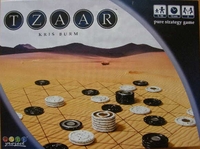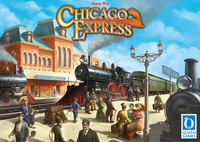Helcon 2008 review, part 3
Let's see what I didn't cover in part 1 or part 2... see also part 4.
GemBlo Pyramid. This dice-pyramid game is apparently good, if played with the expert rules. Well, we couldn't figure them out, so we tried the basic game. That one isn't good, since making the pyramids isn't particularly interesting and the game seems a tad too dependant on getting good dice. Or then not, but in any case, if I try GemBlo Pyramid again, the expert game it'll be.

TZAAR. This is the latest entry in the Gipf Project and a surprisingly simple game. Both players have three types of pieces, but they all are functionally identical: all move like rooks on a hex grid and capture other pieces. First move you make must be a capture, other can be a capture or a stacking move. You can build stacks of your own pieces and to capture, the capturing stack must be at least as high as the stack being captured.
It's deceptively simple. The reason you have three kinds of pieces is the victory condition: you win when your opponent doesn't have all three kinds of pieces available. You also win when your opponent cannot capture. Very simple, yet of course deeply challenging once you get into it. This is a really fine abstract, I'd say, and one I'm eventually going to add to my collection, I think.

Kamisado - on the other hand - is less interesting. This is an ugly game, with really strange-looking pieces and very bright and colourful board - a far cry from the black and white elegance of Gipf games. Here a simple goal of getting your piece across the board meets an elegant mechanism, where the square the piece ends its moves determines which opposing piece will move.
Kamisado is very much about counting moves ahead and avoiding mistakes. Squares will become dangerous as opposing pieces have clear routes to the goal row, so you can't move to this colour or that colour until the enemy pieces have been blocked. Clever, but I didn't like it very much. This is certainly a game with possibilities for really deep play, but for some reason I don't find this nearly as charming as, say, the Gipf games.

Keltis. This board game version of Lost Cities won Reiner Knizia his first Spiel des Jahres. It was well-deserved. The game is a good family game. Play cards to advance on scoring tracks, very simple and yet quite engaging. Nothing I'd need to own, but fun to play, sure!
There are some extra features added to the basic structure, the scoring is simplified and as a clever change, you can play cards in either ascending or descending order. This makes things more interesting, when everybody isn't trying to get the same cards at the same time. The Irish theme is of course non-existential and perhaps a tad bland compared to Lost Cities, but at least the green board looks pretty. I do understand the Lost Cities re-theming Rio Grande did.

Chicago Express. This new edition of Wabash Cannonball is pretty. Typical Queen Games quality, that is. This time the game is excellent, too, which is an improvement as most Queen games haven't been that inspiring. I'm not in a rush to update my copy of Wabash, but this edition does make teaching the game a tad easier.
Well done, Queen Games, and congrats to John Bohrer for getting this deal done. I wonder how it was possible, since Bohrer doesn't seem like the easiest guy in the board game industry and I've heard similar things about the Queen Games boss... Who cares, when a game this good gets a treatment this fine.

Toppo. This one is fairly unknown considering it's a Knizia title published by Rio Grande and Amigo. Toppo is a speed game, where players quickly play cards, trying to "top" a set of three cards with colourful symbols that remind me of ESP test cards.
Topping a set means that every card shares a colour or shape with one of the cards on the table. If that happens, then the cards replace the earlier set and show goes on. First player to get to under ten cards wins. There's a hazy detail in the rules: if the cards need to match colour or shape, what if they match both? "Or" is a tricky word. The rules of the game are pretty bad for such a small game in any case. I missed few points (well, large part of problems were caused by reading the rules too quickly), causing the game to seem a tad tedious.
Played correctly Toppo might be an interesting speed game. Nothing like Flix Mix or Set, by no means, but something decent anyway. I'll comment more once I try this game with completely correct rules.
One more part, I think, and that's Helcon games covered.
0 TrackBacks
Listed below are links to blogs that reference this entry: Helcon 2008 review, part 3.
TrackBack URL for this entry: http://www.melankolia.net/mt/mt-tb.cgi/7050

Leave a comment